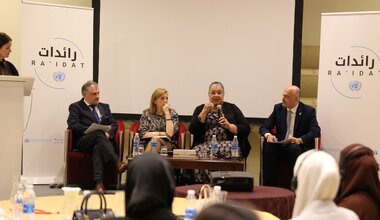With UNSMIL facilitation, legislators and legal experts come together to unify approach to drafting a reconciliation law
The United Nations Support Mission in Libya and the Office of the United Nations High Commissioner for Human Rights brought together 22 legislators, legal experts and civil society actors 23 April to work on draft reconciliation legislation for the country.
During the two-day workshop in Tunis, participants combined two draft legislations that have been separately developed – one by a legal committee formed by the Presidential Council as part of its mandate and one prepared by the House of Representatives. The group, which included representatives from both of these bodies as well as the High Council of State and the Constitutional Drafting Assembly, went through the unified draft law line by line, discussing contentious points and proposing solutions, while ensuring the law reflects international best practices in transitional justice and reconciliation.
Participants discussed the role of amnesties and the importance of memorialization in Libya’s reconciliation process, and whether a reparations programme should target individuals or the collective. The group also considered the type of violations that the law will cover and the selection mechanism for members of a future truth and justice reconciliation commission.
By the end of the workshop, the participants had agreed on a single comprehensive draft law, which will now be submitted to the House of Representatives Justice and Reconciliation Committee before going to the House of Representatives for a plenary vote.
This is the first time representatives from the Presidentical Council’s legal committee, the House of Representatives and the High Council of State, have met to discuss the details of a reconciliation and transitional justice law.
Working in silos has complicated the process, said House of Representatives Member Intissar Mustafa, who participated in the workshop, adding that she hoped the meeting would result in a “minimum standards framework that can be built upon in the next phase.”
Adel Al-Amin Karmous, the head of the High Council of State’s Legal Affairs Committee, also expressed frustration about how political division has hampered national reconciliation efforts.
“The formulation and adoption of standards from a legal and theoretical perspective is achievable,” he said. “The real obstacle will be the implementation.”
Libya previously adopted two transitional justice laws: Law 17 in 2012 and Law 29 in 2013. However, experts criticized the laws for not holding all parties to account, neither laws were implemented. Both the General National Congress and, later, the House of Representatives declined to take the necessary legal steps to enact key provisions, such as setting up a fact-finding and reconciliation commission. Since then, armed conflict, political division, questions of institutional legitimacy and other issues have complicated progress.
"The new draft attempts to address the shortcomings of Law 17 and Law 29," said University of Benghazi Law Professor Suleiman Ibrahim.
The draft prepared by the Presidential Council is the result of inclusive consultations, including a meeting with more than 100 victims’ representatives, held in Tripoli, with support from UNSMIL in February of 2024.
“It is necessary in Libya to end the political divide and unify the government, but this alone is not enough,” he said. “There are root causes of division that need to be addressed. What we are doing here today is laying the groundwork for that.”
Launching a comprehensive national reconciliation process is key to establishing stability and lasting peace in Libya, by responding to victims’ demands for truth, justice and reparations, said Suki Nagra, Head of UNSMIL’s Human Rights and Rule of Law Section and OHCHR Representative for Libya.
“Libya needs a strong transitional justice law as a foundation for lasting stability,” Nagra said “The lack of recognition of victims’ rights and the failure to address past grievances continues to fuel cycles of violence and contribute to Libya’s crisis of legitimacy. The absence of rule of law also feeds into new grievances as demands for accountability continue.”
 United Nations Peacekeeping
United Nations Peacekeeping UN
UN









